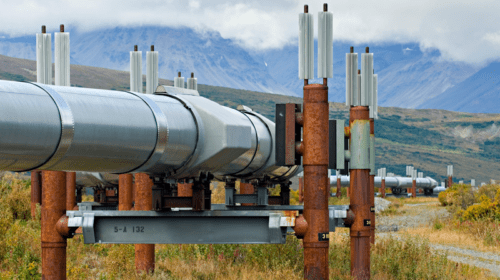For energy companies that were built on the hydrocarbon molecule, there is no single template or formula for becoming a more sustainable, less carbon-intensive business. Some are doing it by evolving their product portfolio or exploring new business models like electric vehicle charging, for example. Others are doing it by pursuing ambitious targets for reducing emissions and carbon footprint. Some are doing it through a series of more subtle strategic investments and operational shifts. And some, of course, are doing it more aggressively than others.
Yet, as different as their approaches to sustainability may be, a common thread runs through many of them, and that’s a drive to maximize the productivity and efficiency of their existing operations. Rather than de-emphasizing their hydrocarbon operations, which likely (and justifiably) will continue to play a critical role in the global energy mix for decades to come, companies have realized, as Jayakrishnan Ramaswamy, director, business process and systems at Crescent Petroleum, put it recently in Forbes, “Sustainability begins with operational excellence.”
Not only is Crescent Petroleum the oldest and largest privately held oil and gas company in the Middle East, in 2022 it claimed to be among the first to achieve carbon neutrality across its operations, which today focus predominantly on natural gas.
Less waste, lower emissions, better management of assets and stewardship of resources – all of this essentially stems from operational excellence and the practices and processes that enable an energy company to operate sustainably and – just as importantly – profitably, during the transition to a lower-carbon world.
Achieving operational excellence doesn’t just put an energy company in a stronger position to meet its sustainability goals and requirements, and perhaps even take a leadership role in carbon-reduction, it enables a company to capture new value across its operations, in part by driving costs and inefficiencies out of the business. Here are four proven approaches companies are using in pursuit of operational excellence:
1. Intelligent automation. As artificial intelligence and machine learning capabilities advance and mature, the opportunities for energy companies to incorporate AI- and ML-driven automation into their operations to capture new value increase, from the field all the way down to the end user. As asset-dependent as this industry is, companies that digitally connect and network their assets gain the ability to apply ML and AI tools to gather insight along every step of the energy molecule’s journey and illuminate ways to make specific processes more efficient and certain facilities lower-emitting. That extends to the energy workforce as well, where new generative AI capabilities are emerging to help companies manage their people more efficiently.
Today, ML and AI also are being used to strengthen predictive maintenance, and to execute certain processes and tasks automatically. We’re seeing more energy companies turn to robotic process automation, or RPA, for example, to automate planning and scheduling.
With the ability to rapidly collect data about, and analyze, the energy molecule’s entire journey, and layer it with huge amounts of other relevant data from disparate sources, companies can identify specific areas of their operations where efficiencies can be captured. And in the not-too-distant future, it may be not just feasible but practical for energy companies to rely on “lights-out” operations, where key assets run on an almost entirely automated basis, with little human involvement.
2. Integrating and streamlining digital IT infrastructure. For hydrocarbon-focused companies seeking to thrive in the energy transition, having a fully integrated digital infrastructure that enables information and insight to flow seamlessly, in real time, across the organization, is a big key to operational excellence. As Crescent Petroleum found when it got rid of bespoke systems and integrated its operations under a single digital system, the insight yielded by operational data translates into better decision-making about how and where to deploy resources to reduce facility emissions, for example, and reveals pathways for more cost- and resource-efficient ways to extract, refine and deliver products to market.
Relying less on custom, code-intensive applications, and turning more to ready-to-integrate, off-the-shelf solutions available in the cloud for non-differentiating business processes (task management, workforce management, documentation, etc.) can help companies capture new efficiencies while cutting IT costs. Some of the biggest names in the energy business (bp, Chevron, Shell, etc.) already are moving in that direction.
3. Building an intelligent, sustainability-focused supplier network. We’re seeing more energy companies build digitally connected supplier networks, then apply AI and ML tools to them to analyze huge amounts of data from inside and outside the company so they can be more responsive and agile in their supply chain decisions, better manage risk, and identify the most sustainable pathways for getting products to market.
4. Embedding sustainability-related metrics into organizational DNA.Hydrocarbons aren’t likely to lose their relevance in the energy mix anytime soon, as DNV, an independent assurance and risk management firm noted in its Energy Transition Outlook 2022, where it predicts 51 percent of the energy mix will be non-fossil by 2050. Still, a big part of achieving operational excellence will be prioritizing sustainability performance alongside financial performance across the business.
“Global oil and gas firms across the long value chain are looking beyond maximizing profits,” Andrew Meyers, who leads IDC’s worldwide oil and gas program, posits in a blog post from late 2022, “and incorporating environmental, social and governance (ESG) metrics into corporate performance assessments.”
With these building blocks for operational excellence in place, energy companies won’t have to compromise profitability in pursuit of sustainability.
Brent Potts is senior director of global marketing, oilandgas, at SAP.
Oil and gas operations are commonly found in remote locations far from company headquarters. Now, it's possible to monitor pump operations, collate and analyze seismic data, and track employees around the world from almost anywhere. Whether employees are in the office or in the field, the internet and related applications enable a greater multidirectional flow of information – and control – than ever before.







